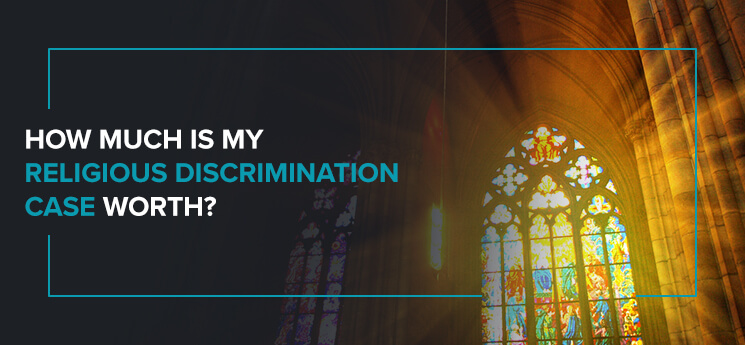Title VII of the Civil Rights Act of 1964 makes it so employers and businesses cannot use their employees’ religious beliefs against them. That being said, if you feel you have been discriminated against in your workplace based on your religious beliefs, you may have grounds to launch a religious discrimination case.
The discrimination you suffer may come in the following forms:
- Harassment
- Refusal to hire
- Termination
- Inhospitable employment conditions, such as fewer hours or no promotions
Although Title VII is a federal statute, most states have their own laws concerning what religious discrimination ultimately looks like and what damages you may be awarded if you win a religious discrimination lawsuit settlement. To get information on these topics, it is best to consult a lawyer in your area or speak to someone at your state’s Fair Employment Practices Agency.
While every state has different laws concerning what constitutes religious discrimination and the results of a settlement, all states must allow religious accommodations, which are perks or exemptions that enable an employee to practice their religion properly and safely. Keep in mind that an employer may ultimately refuse a particular religious accommodation if they deem it unnecessary or think it will lead to company hardships. These accommodations may mean break times for prayer or being able to wear specific headwear.
Average Settlement For Religious Discriminator Cases
If the court ultimately deems you have suffered religious discrimination in the workplace, you are entitled to certain damages. If you file a discrimination claim and win your settlement, you’ll find out what exactly you are owed. However, before that happens, you can only speculate on what you will receive. This is because the circumstances of all cases are different.
One way to gauge how much your settlement might be is to calculate any lost income you might have suffered due to the discrimination. For example, if you were fired from your job for your religious beliefs and couldn’t find work for three months, you may be entitled to that three months of income you lost out on.
It is essential to do your research when finding legal representation for your case, as the legal process for discrimination claims can be a challenging and long road. You want to make sure the firm that represents you or provides you with legal counsel can make your case a priority.
Damages in Religious Discrimination Cases
In general, damages or monetary awards include lost wages, getting your job back or front pay if you are not allowed to return to your job. You may also be entitled to compensatory and punitive damages. Compensatory damages are meant to pay you back for pain and suffering. Punitive damages are intended to go towards punishment against an employer.
Pain and suffering refer to any psychological issues you may have suffered due to the discrimination you faced — for example, depression, anxiety, fear and stress all count towards compensatory damages. If you suffer from psychological issues because of the discrimination, you can use your settlement to pay for therapy or other treatments.
The following are types of damages you might recover if you win your settlement:
- Economic damages: Economic damages refer to your economic losses. Your economic losses might include lost benefits or lost wages due to the discriminatory activity against you. Keep in mind that it’s best to try and find a new job if you’re wrongfully terminated, as you have a duty to lessen your economic damages. An expert witness may be called to determine damages if your case involves lost career growth or promotions.
- Noneconomic damages: These damages are meant to compensate you for any emotional suffering the discrimination you faced caused you. That being said, you will have to prove these damages by keeping records or providing detailed testimony on the harm caused to you. You may also get therapy or other treatments to ease your suffering. These treatments may help your mental health and make your case more compelling due to the detailed treatment and records that a therapist or other professional will perform and keep.
- Punitive damages: As previously discussed, these damages are meant to punish the person or persons who discriminated against you. These damages are only relevant if the person or persons who discriminated against you did so with knowing disregard of your rights or with malice.
- Attorneys’ fees and costs of suit: The attorneys’ fee award depends on how much time your attorney spends on your case overall. An award of costs depends on the exact amount of money your attorney and you spend on your case.
Being aware of the different types of damages you may be entitled to will help you understand the value of your case.
What Is My Religious Discrimination Case Worth?
What your religious discrimination case will be worth will depend on the following factors:
- The strength of your proof and the risk you will lose at liability
- Whether your employer has the money to pay a judgment
- Whether your employer’s conduct was egregious and likely to outrage a jury
- The extent of damages you suffered
- Whether your case is in private arbitration or court
- Whether your employer has insurance policies that cover the claims and how much those policies are worth
- Whether your employer has a history of violating employees’ rights
- Your concerns about the litigation process
Get a Free Consultation From Weisberg Cummings
At Weisberg Cummings, we are dedicated to offering legal counsel and a thorough defense to those who have been discriminated against. If you work with us, you can be sure that you and your case will be treated ethically and with respect. Learn more about us and what we can do for you through the testimonials and blog articles on our website.
If you’ve been religiously discriminated against, call us today at 855-716-2367 to set up a consultation.



